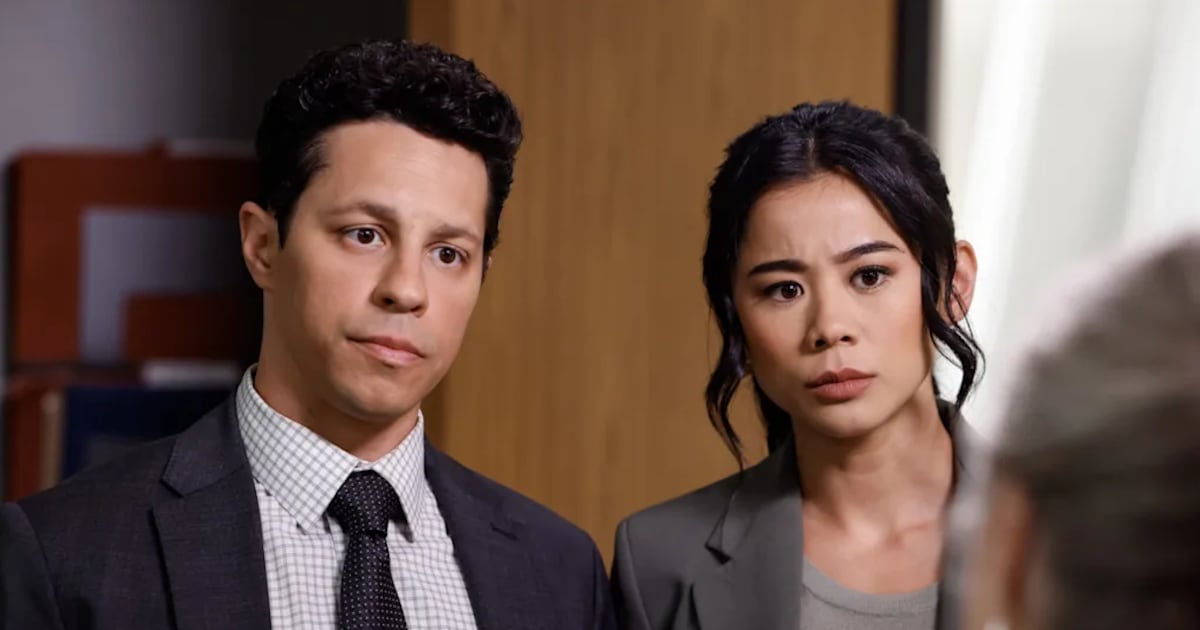Jenny Han is blossoming into rom-com royalty. Pushing the genre forward from every angle—books, films, and now, a TV series—the author has made the case that she deserves a spot on the pedestal with all-timers like Nora Ephron and Nancy Meyers. If not for the romances, then at least for her pristine kitchens, which could easily serve Diane Keaton or Meg Ryan.
Han’s new TV series, an adaptation of her novel The Summer I Turned Pretty, cements her as the queen of crushes. A bit quieter than To All the Boys I’ve Loved Before, the last cinematic take on her work, the Prime Video series is packed with beachy vibes thanks to endless sundresses, hunky boys shredding their shirts, and the crash of waves echoing over all seven episodes. If you love summer, rom-coms, and Taylor Swift, you’ll adore The Summer I Turned Pretty.
Though the boys are perhaps not as alluring as Noah Centineo once was in To All the Boys, Isabelle (Lola Tung)—aka Belly, the cutest nickname that ever was—has the strongest feelings of all time for her crush. Belly will see your scribbling names in hearts and raise constant daydreams for years on end. Belly is in love with her family friend Conrad (Christopher Briney), who tags along on her annual visit to Cousins Beach. But his little brother Jeremiah (Gavin Casalegno) happens to pine for Belly—love triangle time!
The Summer I Turned Pretty is special to me, and I imagine for other young girls who read it before their first kiss, their first love, or before they could really understand what flirting was too. Basically: The book shaped our entire understanding of relationships, even if the story was soapy and hopelessly romantic. We’ve been wishing for over a decade to see the book end up on screen—since 2009, when iPod Touches allowed us to soundtrack our (entirely unromantic) lives.
In honor of a TV series finally coming to fruition, Jenny Han, the master behind affairs of the heart and the show, sat down to unpack her sweet coming-of-age tale.
How did you translate this story, which was originally written over a decade ago, into a 2022 groove?
That was my goal: to approach adaptation as if I was writing it for the first time, in the present day. I wrote the books in my early twenties. The books came out 13 years ago, but I’ve been working on them for longer than that. It’s been a really long time! In many ways, culture has moved and changed, and so have I. But I also think some things are the same. I wanted to make sure that the essence and the core of the characters were all still who they are.
You might remember from the books [that] they don’t text each other, really, and there’s no social media. I always wanted it to feel like this was a separate time and place, in a way. Cousins Beach was somewhere where they’re not super-hooked into their phones. That still feels accurate to me in some ways, because when I go to Martha’s Vineyard, it’s really hard to get any reception. The last time I was there, I couldn’t use my phone.
You’ve got fans like myself, who’ve been waiting years to see this on screen, but you’ve also got a whole new batch of younger fans about to see this story for the first time. How did you cater to both audiences?
That’s the hardest part! You really want to serve the fans, but you also want to make sure that people understand what story you’re telling without having read the books. I was really looking at it like: What do fans care the most about? I wanted to make sure that was in there, be it a certain scene or a line. That kept being my touchstone to go back to, over and over again. … I was also looking at it like: How do you adapt a very insular story for TV? You have to really broaden it out and have much more space for her world, that doesn’t just exist for her but a whole cast of characters.
And Lola Tung is so perfect for this role. What were you looking for when you were casting Belly?
I was looking for a certain kind of energy and innocence, but also somebody who blurts out what they’re thinking and has that rawness. Someone that you could really root for and really care about, and be along for her journey. That’s how I felt when I first saw Lola.

Jeremiah (Gavin Casalegno) and Isabelle (Lola Tung) are friends-turned-lovers—or are they???
Peter Taylor/Amazon Prime VideoI have to know, because I love it so much: Where did the nickname Belly come from?
It’s very divisive! Some people hate it, some people love it. I was nannying a girl [when] I was in grad school. She had a friend named Isabelle, but everybody called her Belly. They were, like, 11 years old. I thought that was really cute.
How did you transform the actors for the flashback scenes? Belly really does look so freakin’ nerdy in some scenes, but so young and gorgeous in others.
Those glasses that she wears are my old glasses—those pink ones. The braces, those things just helped her feel younger.
In that opening montage, when we go from young Belly in the pool to older Belly on the couch, there are people who watched that who didn’t even realize it wasn’t a different actress, at first. She managed to really look 13 years old in that scene.
How do you film, as opposed to write, someone as they’re developing a crush?
In the case of Summer, Belly’s had this crush for a very long time. It’s been years of nurturing this crush on Conrad. We were able to do flashbacks to show that progression. That was the trickiest part of the story, because the Conrad that we meet the summer in the present is not the Conrad that she’s known her whole life. He’s in a really different place. The flashbacks were helpful in showing that he wasn’t always so withdrawn and sullen, that there was something about him that was sweet. Something someone could fall in love with.
Jeremiah is fluid with his sexuality in this adaptation, a change from the book. Where did that idea come from?
When I was looking at the characters and really wanting to feel like the essence was there for all of them, but [also asking] who would they be in 2022, I felt like that was true to the character. I felt like Jeremiah is somebody who is really unselfconscious, and really comfortable with himself and comfortable in his own skin. If I were telling the story today, that’s how I would tell the character. Since that’s how I approached the adaptation, it really felt natural to me, as I was looking at: How does the world look today? How do kids think about sexuality? Thinking about how it’s less binary now, and having less strict labels.
What was your favorite part of the book to see in real life?
When I walked in the house for the first time, I definitely teared up and felt really emotional about it. To see… something that had been in my head then become real was definitely an emotional moment for me. So many of those moments of Belly on the beach with the boys, seeing it come to life was more than I could imagine, in some ways.
Also, [I loved] being able to set it to music and pick songs that I thought really punctuated the moment… As a teenager, I was always picturing my life with songs in the background. It was cool to be able to do that for her in the story.
When I originally read the book, I was definitely putting a soundtrack together in my head as the story played out. And the music in the show—Taylor Swift, Olivia Rodrigo, even “Teenage Dirtbag” by Wheatus—lives up to my expectations! How did you pick which songs to use?
Some songs came really easily for me to pick out. Some songs took a lot of tries to get it right. One of the harder songs was [for] the moment in the final episode when [Belly’s] at the mirror, thinking about beauty and growing up. What is the right song for that moment? I was very excited that we were able to get the song that we did [“thank u, next” by Ariana Grande], because that’s actually one of my favorite songs. It was a triumphant moment that the music really lent itself well to.






